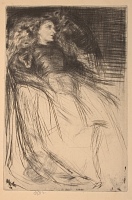Etchings Institutions search term: british museum
Weary | ||
| Number: | 93 | |
| Date: | 1863 | |
| Medium: | drypoint and roulette | |
| Size: | 199 x 132 mm | |
| Signed: | 'Whistler.' at lower left (4-final) | |
| Inscribed: | '63.' at lower left (4); date removed (5) | |
| Set/Publication: | no | |
| No. of States: | 6 | |
| Known impressions: | 35 | |
| Catalogues: | K.92; M.92; T.71; W.83 | |
| Impressions taken from this plate (35) | ||
TECHNIQUE
This fine and atmospheric study was drawn entirely in drypoint, with delicate and oft-repeated outlines, fine details and complex cross-hatching. According to Lochnan the drypoint was executed using very fine lines.
'Few impressions were taken, largely because of the speed with which the burr would have worn. They are printed for the most part in black ink on very thin, silky japon mince which enhances the aesthetic beauty and delicacy of the subject.' 20
20: Lochnan 1984 , p. 149.
However, there is a larger print-run of the third state than would normally be expected for a drypoint, and roulette was used to reinforce the deep shadows in the fifth state.
PRINTING
There was a surprisingly large print-run of over 30. The need to revive the drypoint is undoubtedly the reason for the several revised states of the etching.
They are nearly all printed in black ink on Japan paper, which varies considerably in texture, colour and quality. Early impressions were on cream lustrous golden Japan ( ) and cream laid Japan tissue (
) and cream laid Japan tissue ( ). Likewise the main print-run, in the fourth state, was on Asian papers including cream (
). Likewise the main print-run, in the fourth state, was on Asian papers including cream ( ) and ivory (
) and ivory ( ) laid Japan tissue; thick, lustrous light buff Japan (
) laid Japan tissue; thick, lustrous light buff Japan ( ); thin ivory Japan (
); thin ivory Japan ( ); thin ivory paper with water spots (
); thin ivory paper with water spots ( ); and buff laid paper (
); and buff laid paper ( ). One exception was printed on cream wove paper, possibly in an attempt to achieve new effects from the plate as it wore down (
). One exception was printed on cream wove paper, possibly in an attempt to achieve new effects from the plate as it wore down ( ).
).
 ) and cream laid Japan tissue (
) and cream laid Japan tissue ( ). Likewise the main print-run, in the fourth state, was on Asian papers including cream (
). Likewise the main print-run, in the fourth state, was on Asian papers including cream ( ) and ivory (
) and ivory ( ) laid Japan tissue; thick, lustrous light buff Japan (
) laid Japan tissue; thick, lustrous light buff Japan ( ); thin ivory Japan (
); thin ivory Japan ( ); thin ivory paper with water spots (
); thin ivory paper with water spots ( ); and buff laid paper (
); and buff laid paper ( ). One exception was printed on cream wove paper, possibly in an attempt to achieve new effects from the plate as it wore down (
). One exception was printed on cream wove paper, possibly in an attempt to achieve new effects from the plate as it wore down ( ).
).
